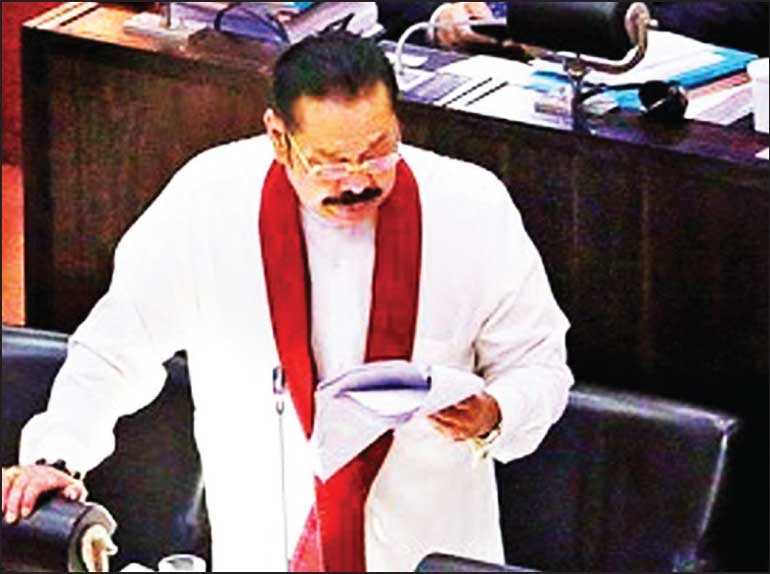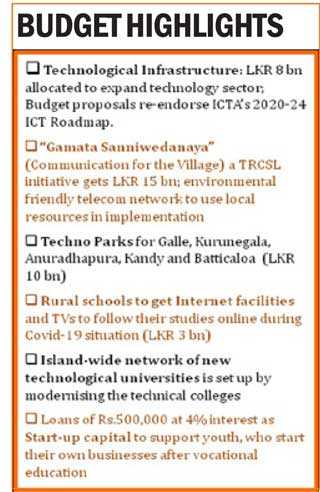Sunday Feb 22, 2026
Sunday Feb 22, 2026
Wednesday, 25 November 2020 00:03 - - {{hitsCtrl.values.hits}}

Prime Minister Mahinda Rajapaksa delivering the Budget speech
Multiple proposals of ‘Vision 2024 for ICTA: A digitally transformed Sri Lanka’ were echoed in the Budget 2021 proposals, the maiden of the present Government, it was observed.
In January 2021, the current administration has charged the Information and Communication Technology Agency of Sri Lanka (ICTA) with implementing a detailed roadmap in line with President Gotabaya Rajapaksa’s vision to establish a digitally inclusive Sri Lanka, with a citizen-centric digital Government for the convenience of every Sri Lankan. The Budget 2021 proposals further re-endorses the initiatives within that road map.
Tech-based society and a smart nation
President Gotabaya Rajapaksa has given special attention to enhance digital governance using Information Technology as a tool to simplify Government mechanisms as well as market structures and processes, ensuring efficient and people-focused service delivery and exchange of knowledge, says the Budget 2021 proposals.
Establishment of an international e-commerce and e-payment systems, the high speed data exchange system and the related mobile network systems are investment priorities. It also emphasised the establishment of new laws and organisational structures in relation to data protection, cyber security and intellectual property rights.
The aim of this is to convert Sri Lankan economy as a technology-based entrepreneurial economy by expanding entrepreneurial development, technological infrastructure and related services to enable enhancement of the contribution of the technology sector for exports and its contribution for knowledge and professional services of the national economy.
Digital government, which makes up a large part of the ICTA’s mandate, would empower citizens of Sri Lanka, allowing easy access to information that would help them in decision making, ensure participation in governance at various levels, allow automated services for public welfare and streamline government functions while ensuring transparency.
ICTA will also be the catalyst that drives Sri Lanka’s digital economy, which will facilitate industry expansion and increased foreign direct investment, while creating opportunity for startup innovation and entrepreneurship through capacity building and tech diffusion. Preferred business and employment opportunities would open up for local companies and the country’s technology industry would move steadily towards the goal of becoming a $ 3 billion export earner by 2024.
Though not explicitly mentioned in the Budget proposals, the other important pillar is digital society. The ultimate goal of digital transformation is achieving a digital society. Both digital government and digital economy must be citizen focused and citizen centred – with due recognition given to the public.
ICTA recognises this need in its design of the ‘Vision 2024 for ICTA: A digitally transformed Sri Lanka’ roadmap that is entirely built around the citizens of the country, be they rich or poor, urban or rural and educated or not. The ultimate goal of ICTA’s vision is to make even the ‘poorest of the poor’ sections of society benefit from ICTs in uplifting their living standards.
Tech parks
The Budget 2021 also proposes creating a techno-entrepreneur-led economy that will contribute to increase of exports and foreign earnings from the technology field and broaden the knowledge and professional services to the national economy within the coming two years. It is expected that the establishment of technology-centred investments and allied service industries will transform into high income employment opportunities for Sri Lankan youth. It is envisaged to establish five fully-fledged plug and play techno parks in Galle, Kurunegala, Anuradhapura, Kandy and Batticaloa Districts. A sum of Rs. 10 billion has been allocated to develop these techno parks as eco-friendly new cities connected to the expressway network and other infrastructure facilities.
Distance education
As the first step towards educational reforms, according to the Budget proposals, there is a requirement to formalise learning methodologies within schools, and the need to expand the provision of internet facilities to schools as well. It is also necessary to update the E-Thaksalawa learning portal, created by Ministry of Education with inputs from ICTA, along with the strengthening of the provincial IT education centres.To minimise the difficulties faced by students in rural and non ‘national schools’, due to shortage of teachers, and ensure the provision of continuous school education in the face of the COVID-19 epidemic, the ‘Guru Gedara’ education channel should be made available to all students by providing television sets to schools in difficult areas. It is proposed to allocate Rs. 3 billion to convert the syllabi in line with the contemporary requirements, regulation of teacher education and training, and examination procedures are planned to be regulated under a national education policy.
With the inevitable disturbances to normal life during the COVID-19 situation all over the country, one of the biggest challenges to educators was to compensate the lost education by the students. With no means for students to meet their teachers face-to-face, the only possible solution was through educating them by distant learning modes. The Ministry of Education came forward with E-Thaksalawa (http://e-thaksalawa.moe.gov.lk) the official E-learning portal for schools with learning content from Grade 1 to Grade 13 which has been made accessible to all students from March 2020, without data charges with the support of all operators enabling school children to study from.
ICTA also facilitated Ministry of Education by introducing how distance learning can be adopted with live video conferencing in teaching and learning process for school children with its own newly-introduced video conferencing too, meet.gov.lk. What the Budget proposes is the continuation of the same for future in the ‘Living with COVID-19’ situation expected for a relatively prolonged period now.
Expanding tech education opportunities
The Budget has also given priority to strengthening the island-wide network of new technological universities, by modernising the technical colleges to be attractive to Sri Lankan youth, under the ‘one TVET’ concept within a formal regulatory framework, by converting these institutes into degree awarding entities in parallel to the expansion of opportunities for university education.
Capacity building activities like these are the key in achieving the goal of making a Smart nation. ICTA is taking steps to build an empowered workforce who can join the industry at multiple levels. ICTA will ensure the competency and employability of the workforce through programs such as vocational training, foundation and conversion programs and social education, apart from the traditional tertiary, higher, professional and postgraduate education. Social education will also play a key role in developing intelligent citizens with the skills to use citizen services.
Electronic identity
The Budget also allocates Rs. 3 billion for the new digital identity project to be spearheaded by ICTA jointly with Department of Registration of Persons. Internationally governments are increasingly adopting the strategy of having a unique digital identity for their citizens with the objective of improving service quality and efficiency. That also drives financial and social inclusion by providing citizens access to citizen services and benefits of healthcare, education, and other government programs. Government of Sri Lanka has given priority to a national level program for the establishment of a Unique Digital Identity framework for the country.
ICTA has developed its digital government and economy frameworks with this aim in mind. The objective is to digitise the service delivery from the Government to citizens, creating nationwide digital service delivery infrastructure that can be utilised digital public utilities serving and bridging all the sectors of the economy. UDI together with the National Data and Interoperability Platform (NDIIP) forms the nucleus of the digital economy and Government frameworks.
Healthcare
The Budget also allocates Rs. 100 million to introduce electronic medical records at more Government hospitals. This is an extension to a project ICTA has been engaged in for the last few years. The Digital Health Project is a collaborative project being implemented by Ministry of Health and Indigenous Medical Services and ICT Agency of Sri Lanka. The project supported 49 Government hospitals in implementing electronic medical records systems.
A National Project Steering Committee, Provincial Project Steering Committees and Hospital Steering Committees were formed with the representatives of Ministry of Health, Provincial Departments of Health Services and ICTA to direct/guide the project implementation at different levels. The project provided computer hardware, software, network and training for the selected hospitals to establish electronic medical records systems.
Nurturing tech startups
The Budget proposals also include providing loans of Rs. 500,000 at an interest rate of, as low as, 4% as start-up capital to support the youth, who start their own businesses on the successful completion of vocational education. This loan will have a grace period of one year for both principal and interest, with a further four years to settle the loan.
Accordingly, these entrepreneurs will be facilitated to receive the opportunity to pay an instalment together with interest less than Rs. 12,000. In order to ascertain that the said loans are invested on the approved business, an annual commitment fee of 0.25% will be charged for follow up and extension services. It is proposed to give tax exemptions of five years to these businesses and the cost of funds of funds provided for such start-up capital, provided by banks and finance agencies as deductible expenditure in the calculation of taxes.
ICTA, over a long period, has been working assisting start-ups to establish themselves in the local ecosystem. Startup Sri Lanka was an initiative by ICTA with the former Ministry and startup community. Its mission is to transform Sri Lanka through technology and entrepreneurship. ICTA is working to support the tech community and accelerate the growth of Sri Lankan startups with the belief that strong home-grown startups and freelance community is vital to the future growth of Sri Lankan jobs and wealth.
ICTA’s efforts are focused on trying to get the big picture right for Sri Lankan startups and freelancers – improving the regulatory environment, building a case for the right sort of Government support for a fast-growing sector, and increasing public awareness of the impact of tech startups and freelancers across the country. ICTA works with startups, freelancers and investors to help around the country get the settings right to create successful startup ecosystems.
ICTA recently worked together with Ministry of Finance in establishing guidelines for State organisations to exclusively procure their software and hardware requirements less than Rs. 2 million from local startups.